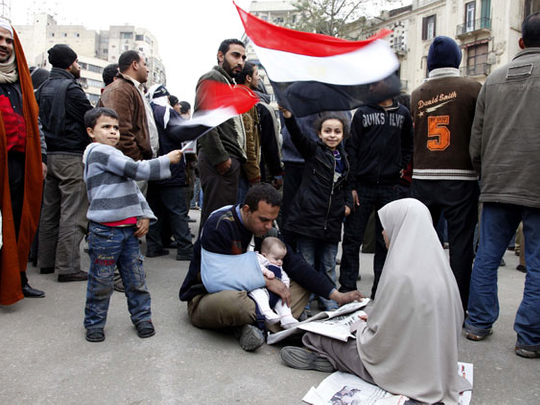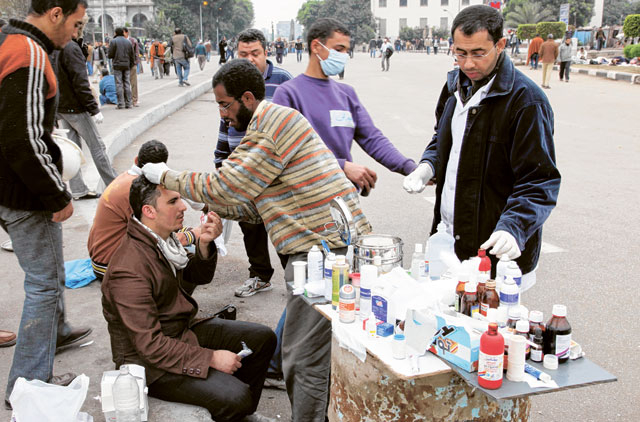
Cairo: For 12 days Tahrir Square has been the canvas on which a revolution has unfolded. At times it has been an almost utopian scene of Egyptian joy, hope and community. But it has also become an inferno of smoke, strife and death.
As Egyptians vie over their country's future, the struggle to control the square has become the central battlefield, playing out for the rest of the world to see. On Friday, the vast, open space near the banks of the Nile remained in the hands of pro-democracy demonstrators, who have vowed not to leave until President Hosni Mubarak resigns his office.
Unlike so many of the demonstrators who have taken to streets across the Arab world in recent decades, most of those who have occupied Tahrir say they are politically secular — and they appear more disappointed in the United States than anti-American.
‘Welcome to Egypt'
They have made "cross and crescent together" an informal slogan, reflecting their embrace of Egypt's minority Christian community. They band together to sing patriotic Egyptian songs but hail foreigners warmly and greet them at checkpoints marked by the burned-out hulls of police vehicles with a hearty "Welcome to Egypt."
As the government's tactics for crushing their movement have escalated, so has the resolve of the demonstrators. When they first occupied the square nearly a week ago, those opposing Mubarak chanted, "We are going to stay in the square."
More recently, the line has changed: "We are going to die in the square." For a government that has brooked little opposition over the course of Mubarak's repressive 30-year rule, the demonstrators' stubborn refusal to leave Cairo's central plaza has been a deep affront. The protesters know that, and they believe that if they stay long enough, Mubarak will be forced to relinquish power. When the protesters in the square are not being attacked by pro-Mubarak forces wielding rocks, sticks and knives, the atmosphere here is remarkably peaceful.
Men with plastic bags filled with pre-packaged food make the rounds, ensuring that everyone has enough to eat. Others meticulously sweep the streets, cleaning up debris from the previous night's battle.
Women lie on blankets covering what was once a manicured patch of green, but is now a wasteland of dirt and mud. Doctors tend to the wounded, bandaging fresh gashes and snugly tying slings.
At prayer time, the chants against Mubarak abruptly stop, and the faithful get down on hands and knees. "Revolution is like a love story," said Alaa Al Aswany, the Egyptian novelist whose writings about the hypocrisy of the Egyptian government and the need for free elections have helped inspire the pro-democracy movement.
Become a better person
"When you are in love, you become a much better person. And when you are in revolution, you become a much better person." But the good mood has often been broken in recent days by spasms of merciless violence. It starts when a roar goes up, signifying that pro-Mubarak forces are surging toward the square.













